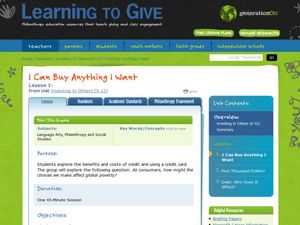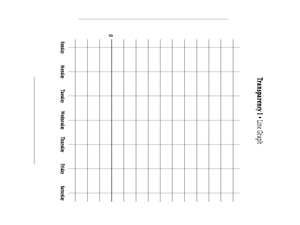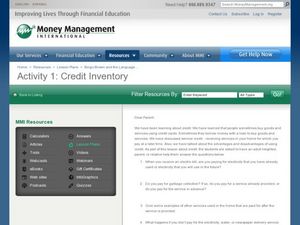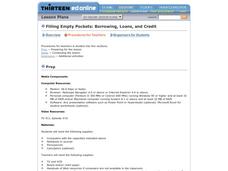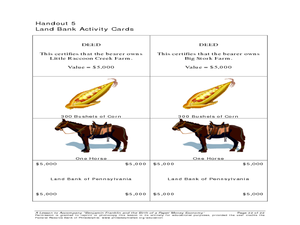PricewaterhouseCoopers
Credit and Debt: Decisions, Decisions...
Borrowing money seems like a great idea until you are in over your head. High schoolers learn the benefits and risks associated with credit and how to be a responsible borrower. More than just credit cards, they learn trustworthiness is...
Federal Reserve Bank
Credit Reports—and You Thought Your Report Card Was Important
Get the facts about credit and take a close look at what factors into a consumer credit report with this fantastic lesson. Your pupils will read informational texts, read sample financial documents, and discuss the advantages and...
Curated OER
I Can Buy Anything I Want: Consumer Debt and Social Responsibility
A clear, comprehensive overview of consumer debt, credit, interest, international currency, and social responsibility, this 45-minute session falters in the application stage. You'll need to create a way for learners to demonstrate their...
Federal Reserve Bank
Creditors’ Criteria and Borrowers’ Rights and Responsibilities
Discover what criteria creditors use for making loans (the 3 Cs of Credit), and impress upon your young adults the rights and responsibilities related to using credit. Pupils role play as individuals seeking or providing credit, as well...
Curated OER
Using Credit and Spending Money Wisely
Students discuss how to spend money wisely. In this consumer math lesson, students read the book, Mr. Popper's Penguins and discuss how much it costs to take care of a pet. Students complete a worksheet to calculate the total cost of pet...
Curated OER
A Lesson to Accompany "Benjamin Franklin and the Birth of a Paper Money Economy"
Students examine the role of money in the colonial economy by participating in a trading activity. In this colonial economy instructional activity, students complete an activity to learn about colonial trade and what happens when there...
Visa
The Danger of Debt: Avoiding Financial Pitfalls
How can our perspectives of borrowing and returning influence the way we view credit? Pupils explore the concept of debt, how it impacts our ability to obtain credit, and finally the ways in which we can work to alleviate debt.
Curated OER
Pay Credit When Credit is Due
Students explore the concept of credit. In this credit lesson, students examine student organizers that focus on credit scores and credit history. Students participate in an on-line activity. Students examine credit card offers and...
Curated OER
Less Than Zero
Students keep track of money. In this money management lesson, students read Less Than Zero by Stuart J. Murphy and manipulate a number line to keep track of spending and borrowing in the story.
Curated OER
Credit Inventory
In this money management worksheet, students read a paragraph regarding credit and then respond to 6 short answer questions regarding credit.
Curated OER
Debit or Credit-You Decide
Students identify the similarities and differences between an debit and credit card. In this debit or credit lesson plan, student explain the advantages and disadvantages of using cash and consumer credit to purchase good and services...
Curated OER
Credit: Taking an Interest in Credit
Students examine how credit works but looking at how credit cards and interest rates work. They use percentages to solve problems using credit card interest rates while completing a worksheets.
Federal Reserve Bank
Less Than Zero
Perry the penguin wants to buy a new scooter, but he doesn't have any funds! Walk your kids through the short book Less Than Zero, and have them track his borrowing, spending, and saving on a line graph while you read. Pupils will learn...
Council for Economic Education
A Penny Saved
A penny saved is a penny earned! Scholars research the different ways to save money over a lifetime. They investigate the Rule of 72, compound interest, and sub-prime loans to gain an understanding of how banks aid in the saving process....
Curated OER
Filling Empty Pockets: Borrowing, Loans, and Credit
Students examine credit components and how each works within our economy today. For this financial literacy lesson, students explore credit terms and make decisions based on real credit card offers that they find in their on line research.
Curated OER
FILLING EMPTY POCKETS: BORROWING, LOANS AND CREDIT.
Students learn that maintaining financial security takes a good math understanding. In this lesson, students apply mathematical formulas to make important financial decisions like getting the right loan to buy a house, decide which...
Learning to Give
Five Thousand Dollars!
How does consumerism affect global poverty? Upper graders find out about cost benefit, wants and needs, and making good consumer choices as they explore this global topic. They role-play an impulse spending experience and work through...
Visa
Home Sweet Home: Purchasing a Place
While the process of buying a home can certainly be overwhelming, give your young adults a leg up for their future by introducing them to the components of a mortgage, as well as exploring the basic concept of credit and how to become...
Curated OER
Interest and Credit
Students define interest and credit. For this algebra lesson, students analyze the pros and cons of having credit versus debit and interest as it applies to credit and debit. Students apply the ideas of interest and credit in their...
Curated OER
Consumer Credit: Buy Now, Pay Later, and More
Learners explore the concept of consumer credit. In this consumer credit lesson, students discuss the costs and benefits of buying with credit. Learners examine scenarios to determine the costs and benefits of using a particular method...
Federal Reserve Bank
It's Your Paycheck
Beyond reading and arithmetic, one of the most important skills for graduating seniors to have is fiscal literacy and responsibility. Start them on the right financial track with nine lessons that focus on a variety of important personal...
Curated OER
A Lesson to Accompany "Benjamin Franklin and the Birth of a Paper Money Economy"
Students investigate the role of money in the colonial economy. In this colonial economy instructional activity, students participate in a trading activity, read the booklet "Benjamin Franklin and the Birth of a Paper Money Economy,"...
Curated OER
Does My hair Disrupt Your Learning?
Students use the internet to research ways to save and earn money. They interview bankers and financial counselors to discover different types of investments. Students create public service announcements to inform their classmates of...
EngageNY
The Mathematics Behind a Structured Savings Plan
Make your money work for you. Future economists learn how to apply sigma notation and how to calculate the sum of a finite geometric series. The skill is essential in determining the future value of a structured savings plan with...




